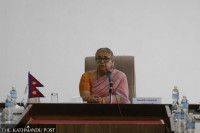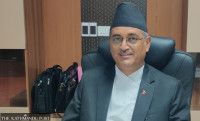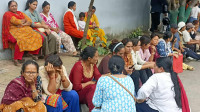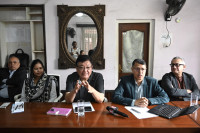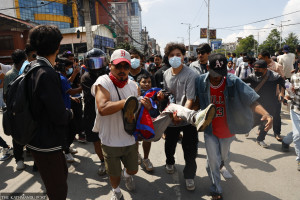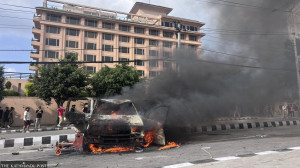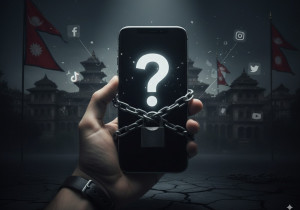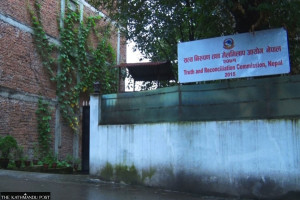National
Many sides to Nepal visit of China’s top legislator
The Chinese appear interested in strengthening ties with Nepali MPs following the passage of the MCC compact.
Anil Giri
Are the Chinese still keen on left unity in Nepal ahead of the November 20 elections? The jury is still out. But the debate will certainly be fuelled in the next few days and weeks.
Li Zhanshu, the chairman of the Standing Committee of the National People’s Congress of China, is arriving on a three-day official visit to Kathmandu on Monday. He leads an eight dozen-strong delegation of ministers, deputy ministers, officials and leaders of the Chinese Communist Party.
According to the Ministry of Foreign Affairs, Li is visiting Nepal at the invitation of Speaker Agni Prasad Sapkota and will call on President Bidya Devi Bhandrai and Prime Minister Sher Bahadur Deuba. He will hold delegation-level talks with Sapkota on the same day, followed by the signing of some agreements. Later, he will meet National Assembly Chairman Ganesh Timilsina and Foreign Minister Narayan Khadka, as per the itinerary.
Li will also meet CPN-UML Chairman KP Sharma Oli as well as CPN (Maoist Centre) Chairman Pushpa Kamal Dahal.
Bishnu Pukar Shrestha, the Nepali ambassador to China, said although the embassy is yet to receive formal communication and agenda of the visit, the trip will be focused on strengthening cooperation between the two countries’ parliamentarians as well as enhancing bilateral ties.
During the visit, say sources, at least two memorandums of understanding related to ‘cooperation and exchange’ will be signed between the Nepali parliamentarians and members of the Chinese People’s Congress.
China watchers said the visit would give Nepal an opportunity to balance its foreign policy and international relations in the wake of growing geopolitical rivalry and competition.
A former Nepali ambassador to China said that even though Li is taking along a large delegation and visiting different countries, the Nepal visit in particular shows China’s renewed interest in its neighbour.
This will be the third highest visit from the north in the past one year following the formation of the Sher Bahadur Deuba government in Kathmandu. In March, Chinese Foreign Minister Wang Yi, who is also the State Councillor of China, visited Kathmandu and discussed a wide range of bilateral issues with the top political leadership. Then, in July, Foreign Department chief of the Communist Party of China (CPC), Liu Jianchao, arrived in Kathmandu and held talks with all major political stakeholders including communist party leaders.
Li, who is Chinese President Xi Jinping’s close aide, is the third-ranking member of the Politburo Standing Committee of the Chinese Communist Party, the top decision making body of China, after President Xi and Premier Li Keqiang.
Besides Nepal, Li will visit Russia, Mongolia and South Korea ahead of the 20th National Congress of the Chinese Communist Party in October. The gathering is likely to give another term extension to Chinese President Xi.
The visit comes ahead of the general and provincial elections scheduled to be held in Nepal on November 20.
Mahesh Maskey, a former Nepali ambassador to China, said the visit from the third-ranking CPC Standing Committee official will be a sign that Beijing is closely following unfolding events in Kathmandu, which is fast turning into a hotspot for big-power geopolitical rivalry. The rivalry between Beijing and Washington DC was manifested soon after the Deuba government started the process of parliamentary ratification of the Millennium Challenge Corporation Nepal Compact.
“Lu’s visit definitely suggests that Nepal is China’s priority,” said Maskey.
“He is visiting all the countries China considers important, particularly in the wake of the Russia-Ukraine war and its own ongoing face-off with Taiwan,” said Maskey.
“As the geopolitical rivalry in Kathmandu heats up, Beijing is closely following events here. Most importantly, the visit is taking place just ahead of the elections.”
Whenever there is a high-level visit from China to Nepal, particularly following the split in the strong Nepal Communist Party in March 2021, there are speculations about whether Beijing will encourage unity among the country’s communist forces.
In their visits in the recent past, both Wang and Liu encouraged UML and Maoist leaders to form an alliance but pushed no particular strategic agenda. Will Li also push for communist unity this time?
Those who are closely following and understand Chinese attitude on left unity in Nepal are divided on whether Li will make such attempts during his meetings with Oli, Dahal and others.
“The Chinese interest is in strengthening interactions between parliamentarians,” said Rupak Sapkota, a China watcher.
This time the focus is on strengthening parliamentary relations and discussing China’s growing international stature, he added. “Not to push for unity between communist forces.”
The Chinese could have realised the importance of Nepal’s parliamentary exercise following the passage of the Millennium Challenge Corporation Nepal Compact, a $500 million US grant agreement, Sapkota added. “Perhaps that was an added motivation to push for greater engagement with Nepali parliamentarians.”
Sapkota also believes Li’s visit will give Nepal a chance to showcase its geopolitical importance as well as to take advantage of the US-China geopolitical rivalry.
“We can shed light on how important we are in terms of our geopolitical positioning. This is also an important opportunity to showcase our balanced, nuanced, non-aligned and independent foreign policy,” Sapkota said.
The visit is taking place just as the major political parties are busy jockeying for supremacy ahead of the elections.
Traditionally, the Chinese leadership has encouraged Nepali communist leaders, particularly those from the CPN-UML and the CPN (Maoist Centre), to forge an electoral alliance.
Sundar Nath Bhattarai, chairman of the China Study Center, said the visit preceding the all-important CPC plenum is highly meaningful. The plenum will solidify Xi’s leadership and clarify to neighbouring and friendly countries what course Chinese leadership will pursue in the next decade under Xi. “We will also know about how China intends to resolve the ongoing crisis in Taiwan and other priority issues,” Bhattarai said.
Unlike Sapkota, Bhattarai believes the Chinese delegation will once again push for left unity.
The Chinese have a soft corner for Nepal’s communist parties and they have been encouraging them to come together and forge an alliance, he said.
“While the Chinese will this time certainly engage with the Nepali Congress, they will continue to push for unity or working cooperation among the major communist forces in Nepal,” said Bhattarai.




 22.12°C Kathmandu
22.12°C Kathmandu
